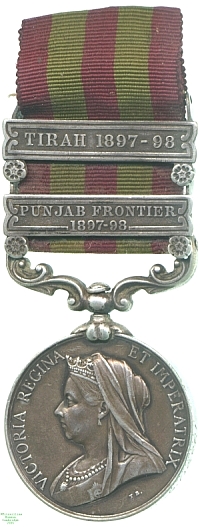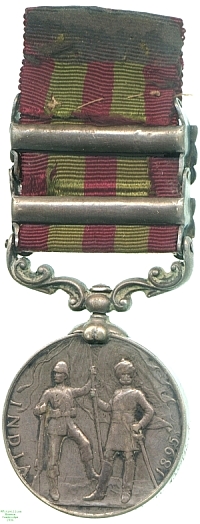
Obverse, a bust of Queen Victoria

Reverse, a British and an Indian soldier supporting a standard together

Obverse, a bust of Queen Victoria |

Reverse, a British and an Indian soldier supporting a standard together |
By 1895 it was beginning to be considered that the 23 bars issued to the India General Service Medal implied a need for its replacement, and in 1896 the new India Medal was first issued.
The North-West Frontier between British India and Afghanistan was a source of political tension for the length of the nineteenth century and beyond, as the precarious Imperial accommodations with local tribes required continual maintenance. In 1897 a particular crisis flared up when most of the Afridi tribes on the Punjab frontier, who had for sixteen years been receiving subsidies to guard the Khyber Pass, rebelled at the same time as the Mohmand tribes beyond the Pass began a raiding campaign.
Because of the number of men available to the Afridis and the stretched demands on British forces it was some time before a response could be coordinated, but towards the end of 1897 a campaign was begun, with one force proceeding to secure the forts around the city of Peshawar, and the other dealing with those in the Tirah area. The latter column, due to shortage of water and the extreme cold of this Himalayan region, ran into great difficulties and beat a fighting retreat, costly to both sides, until they could join forces with the Peshawar column. This combined force managed to secure the Khyber forts over Christmas 1897 and peace was secured the next year.
The bar for Punjab Frontier 1897-98 was awarded to all units involved in the campaign, but the retreat from Tirah was felt to merit a bar of its own. This medal bears both, and was awarded to Orderly Gunner R. D. Patch of the 9th Mountain Battery, Royal Artillery. Lester Watson acquired the medal at some point before 1928.